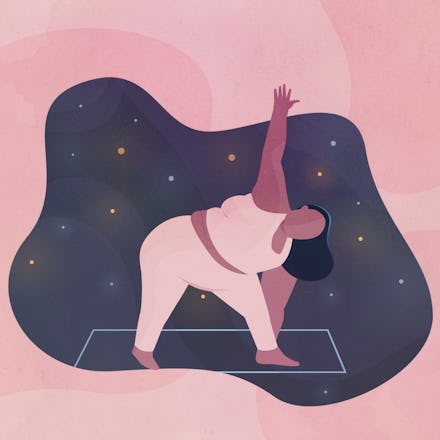Want to get healthy? Shed the cycle of shame around weight, first.

Every year my friends and I try another diet. This year it was the Whole30, a few years ago it was The 4-Hour Body (or the South Beach Diet or some other low-carb diet). Right now, everyone is going vegan. Some even gluten-free vegan. All I know is I’ve pretty much always managed to include french fries.
My friends and I identify as feminists, as in, we’re critical of any industry that relies on shaming women and holding them up to unattainable expectations. But that doesn’t mean we are immune to the seduction of “getting healthy” and all the corresponding benefits society seemingly promises the thin: more lovers, glamorous parties, marriage, great jobs, mansions, Emmys and whatever else people draw a crooked line to weight from.
We are not alone. As of 2014, dieting and weight-loss products made up a $60 billion industry. But traditional dieting appears to be unfashionable, and the industry’s messaging has evolved from quick diets or miracle weight-loss products to an emphasis on health and wellness. The good news is people are getting healthier by eating more whole foods and exercising.
But is “wellness” just dieting under a different name, especially when it means cutting out entire food groups (like in paleo, gluten-free and vegan diets)? And there are reports that “healthy” can also be another way to cover up a troubling relationship to food and exercise.
Is there a way for a feminist to get healthy without being mired by the self-hate-lose-weight cycle?
Personal trainer, fitness writer and founder of Black Girl’s Guide to Weight Loss, Erika Nicole Kendall told me over email that the diet industry’s “business model is to profit off the shame of the public.” Kendall would know. She has lost some 170 pounds through mindfulness, self-care, eating well and working out, as documented on her website. She now focuses on helping other women, especially low-income women of color, on their own journey.
When I discovered her website a few years ago, I read it religiously for its perfect balance of practical advice, honesty and her empathy for people struggling with weight issues on all ends of the spectrum.
As a fairly body-positive feminist who has struggled with disordered eating, I’ve often felt confused between all the different directives: Should I not diet at all and just love myself? (Sounds great! You can take it up with my doctor.) I’ve always been skeptical of the diet industry, but I know I should be taking better care of myself. Is there a way for a feminist to get healthy without being mired by the self-hate-lose-weight cycle?
Kendall does think weight-loss can be feminist. “I think any situation where a woman is learning about her body and what steps to take to affect it in a healthy, shame-free fashion is, at its core, feminist-inspired.” She said she sees a move towards a healthy lifestyle as prioritizing women and we are rarely “encouraged to learn about our bodies in meaningful ways without shame or societal pressure involved.”
In response to what Kendall rightfully calls a “trash” industry, there has been a feminist response to the endless, mind-numbing propaganda women have thrown at them to lose weight. Movements like body positivity and fat acceptance have fought against everything from fat rejection in Hollywood to everyday discrimination fat people face — a discrimination that is considered socially acceptable and not classified as such, so recourse is limited. Kendall said that “healthy at any size” has been a “game changer in giving women the space to forgive their bodies for not doing what ‘eat less, move more’ tells them those bodies should do.”
That said, there are a lot of different reasons people might need to get healthier and while losing weight is not always the best indicator, fat acceptance might not always give them the right tools. Body acceptance, she said, doesn’t change that there is “an intersection of people who experience major quality of life challenges that they think can be impacted by weight-loss.”
A big part of what makes lasting weight-loss hard is the cycle of shame and corresponding responses we often have to shame: hiding our fears and insecurities or eating and exercise habits. Another factor is the lack of good role models: people that have lost weight or want to, but don’t hate fat people.
Kendall said she hopes that women who have lost weight “realize how complex and complicated as weight loss can be, that they feel encouraged to display a little empathy to their fellow fat, formerly fat, and frankly non-fat peers, too, instead of being the former fat person who now hates fat people because they didn’t suffer the ‘work’ of it like they did.”
One concrete way the industry can change is by showcasing different types of healthy people, so we see realistic role models around self-care and self-help, like Kendall (because not everyone can relate to Gwyneth Paltrow!).
“I’m pretty clear about who and what I am when I enter spaces that are exclusively designated for my peers in the fitness industry — they look at a chubby black woman with big hair and a flawless sneaker collection and wonder why I’m there,” she said of her work as a personal trainer. She said she’d like to believe that her own presence in those spaces changes how others feel about who has access to them.
Her advice for anyone trying to navigate the ups and downs of getting healthy is to find a community and resources that don’t “treat you like it’s wrong for you to want to keep your dignity and self-esteem in tact along your journey.”
But most importantly she said, “Nourish your body in a way that satisfies you, fulfills you, and brings you joy.”